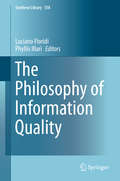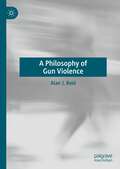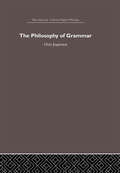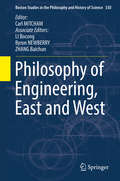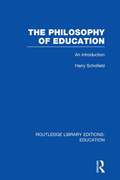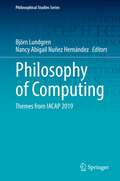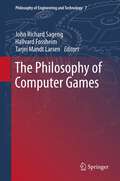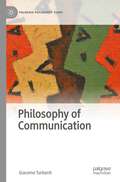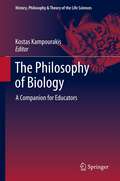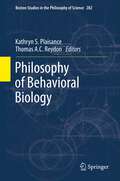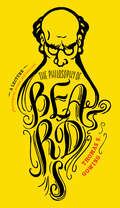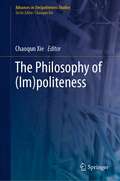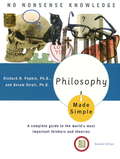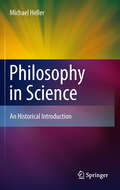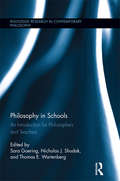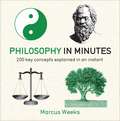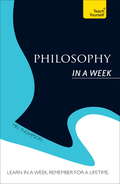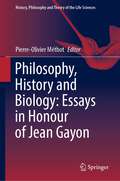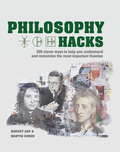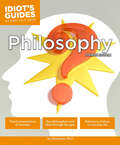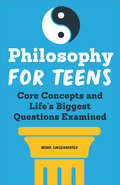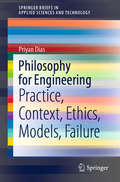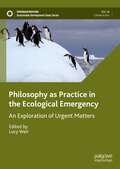- Table View
- List View
The Philosophy of Information Quality (Synthese Library #358)
by Luciano Floridi Phyllis IllariThis work fulfills the need for a conceptual and technical framework to improve understanding of Information Quality (IQ) and Information Quality standards. The meaning and practical implementation of IQ are addressed, as it is relevant to any field where there is a need to handle data and issues such as accessibility, accuracy, completeness, currency, integrity, reliability, timeliness, usability, the role of metrics and so forth are all a part of Information Quality.In order to support the cross-fertilization of theory and practice, the latest research is presented in this book. The perspectives of experts from beyond the origins of IQ in computer science are included: library and information science practitioners and academics, philosophers of information, of engineering and technology, and of science are all contributors to this volume.The chapters in this volume are based on the work of a collaborative research project involving the Arts and Humanities Research Council and Google and led by Professor Luciano Floridi, University of Oxford.This work will be of interest to anyone handling data, including those from commercial, public, governmental and academic organizations. The expert editors’ contributions introduce issues of interest to scientists, database curators and philosophers, even though the issues may be disguised in the language and examples common to a different discipline.
A Philosophy of Gun Violence
by Alan J. ReidThis book uses a philosophy of technology to demonstrate that guns are predisposed for an intentional use, making them inherently non-neutral artifacts. This argument rejects the often-cited value neutral thesis and instrumentalist view that “guns don’t kill people; people kill people”, and instead, explains the lethality of the gun through the lenses of affordance theory, behavioral design, and choice architecture. Ultimately, this book proposes an ethical and value-sensitive model for gun reform, which embodies the perspective of French philosopher Bruno Latour, who said, “You are different with a gun in your hand; the gun is different with you holding it.”
Philosophy of Engineering, East and West
by Carl Mitcham Bocong Li Byron Newberry Baichun ZhangThis co-edited volume compares Chinese and Western experiences of engineering, technology, and development. In doing so, it builds a bridge between the East and West and advances a dialogue in the philosophy of engineering. Divided into three parts, the book starts with studies on epistemological and ontological issues, with a special focus on engineering design, creativity, management, feasibility, and sustainability. Part II considers relationships between the history and philosophy of engineering, and includes a general argument for the necessity of dialogue between history and philosophy. It continues with a general introduction to traditional Chinese attitudes toward engineering and technology, and philosophical case studies of the Chinese steel industry, railroads, and cybernetics in the Soviet Union. Part III focuses on engineering, ethics, and society, with chapters on engineering education and practice in China and the West. The book’s analyses of the interactions of science, engineering, ethics, politics, and policy in different societal contexts are of special interest. The volume as a whole marks a new stage in the emergence of the philosophy of engineering as a new regionalization of philosophy. This carefully edited interdisciplinary volume grew out of an international conference on the philosophy of engineering hosted by the University of the Chinese Academy of Sciences in Beijing. It includes 30 contributions by leading philosophers, social scientists, and engineers from Australia, China, Europe, and the United States.
The Philosophy of Education: An Introduction (Routledge Library Editions: Education)
by Harry SchofieldThere are many students who find philosophy of education difficult, because they have never received teaching in the basic essentials of general philosophy. This book begins by asking the basic question ‘what is philosophy?’ and examines a number of possible answers. Step by step the reader is introduced to the modern techniques of linguistic and concept analysis. Whenever a technical term is used it is explained and illustrated by reference to familiar situations in everyday life.
Philosophy of Computing: Themes from IACAP 2019 (Philosophical Studies Series #143)
by Björn Lundgren Nancy Abigail Nuñez HernándezThis book features a unique selection of works presented at the 2019 annual international conference of the International Association for Computing and Philosophy (IACAP). Every contribution has been peer-reviewed, revised, and extended. The included chapters are thematically diverse; topics include epistemology, dynamic epistemic logic, topology, philosophy of science and computation, game theory and abductive inferences, automated reasoning and mathematical proofs, computer simulations, scientific modelling, applied ethics, pedagogy, human-robot interactions, and big data, algorithms, and artificial intelligence.The volume is a testament to the value of interdisciplinary approaches to the computational and informational turn. We live in a time of tremendous development, which requires rigorous reflection on the philosophical nature of these technologies and how they are changing the world. How can we understand these technologies? How do these technologies change our understanding of the world? And how do these technologies affect our place as humans in the world? These questions, and more, are addressed in this volume which is of interest to philosophers, engineers, and computer scientists alike.
The Philosophy of Computer Games
by Tarjei Mandt Larsen John Richard Sageng Hallvard J FossheimComputer games have become a major cultural and economic force, and a subject of extensive academic interest. Up until now, however, computer games have received relatively little attention from philosophy. Seeking to remedy this, the present collection of newly written papers by philosophers and media researchers addresses a range of philosophical questions related to three issues of crucial importance for understanding the phenomenon of computer games: the nature of gameplay and player experience, the moral evaluability of player and avatar actions, and the reality status of the gaming environment. By doing so, the book aims to establish the philosophy of computer games as an important strand of computer games research, and as a separate field of philosophical inquiry. The book is required reading for anyone with an academic or professional interest in computer games, and will also be of value to readers curious about the philosophical issues raised by contemporary digital culture.
Philosophy of Communication (Palgrave Philosophy Today)
by Giacomo TurbantiBy comprehensively exploring the theoretical questions raised by professional communication, this book provides an introduction to the philosophy of communication. Key Features:Arranged in three parts encompassing the theory of communication, conflict transformation and the role communication plays within organizations. Examines how agreement is reached through communication, how such agreement is negotiated between different perspectives and how such negotiation produces our organizations. Includes a full range of pedagogical features, including study questions, essay questions. chapter summaries, focus points and suggestions for further reading. Philosophy of Communication is essential reading for all students of the philosophy of communication.
The Philosophy of Biology
by Kostas KampourakisThis book brings together for the first time philosophers of biology to write about some of the most central concepts and issues in their field from the perspective of biology education. The chapters of the book cover a variety of topics ranging from traditional ones, such as biological explanation, biology and religion or biology and ethics, to contemporary ones, such as genomics, systems biology or evolutionary developmental biology. Each of the 30 chapters covers the respective philosophical literature in detail and makes specific suggestions for biology education. The aim of this book is to inform biology educators, undergraduate and graduate students in biology and related fields, students in teacher training programs, and curriculum developers about the current state of discussion on the major topics in the philosophy of biology and its implications for teaching biology. In addition, the book can be valuable to philosophers of biology as an introductory text in undergraduate and graduate courses.
Philosophy of Behavioral Biology
by Kathryn S. Plaisance Thomas A.C. ReydonThis volume provides a broad overview of issues in the philosophy of behavioral biology, covering four main themes: genetic, developmental, evolutionary, and neurobiological explanations of behavior. It is both interdisciplinary and empirically informed in its approach, addressing philosophical issues that arise from recent scientific findings in biological research on human and non-human animal behavior. Accordingly, it includes papers by professional philosophers and philosophers of science, as well as practicing scientists. Much of the work in this volume builds on presentations given at the international conference, "Biological Explanations of Behavior: Philosophical Perspectives", held in 2008 at the Leibniz Universität Hannover in Germany. The volume is intended to be of interest to a broad range of audiences, which includes philosophers (e.g., philosophers of mind, philosophers of biology, and metaethicists), as well as practicing scientists, such as biologists or psychologists whose interests relate to biological explanations of behavior.
The Philosophy of Beards: A Lecture: Physiological, Artistic & Historical
by Thomas S. GowingA humorous and bizarre artifact from the Victorian culture of manliness, and the perfect gift book for the man in your life -- bearded or not.The Philosophy of Beards is a curious look into the Victorian culture of hyper-manliness. The author makes his case for the universal wearing of a beard--proclaiming that a beard is the essential symbol of manly virtue and distinction since time immemorial. The book is here republished for the first time since 1854 in this disctinctive gift edition, edited by the British Library with illustrations of impressive beards from history.
The Philosophy of (Advances in (Im)politeness Studies)
by Chaoqun XieThis book explores what new light philosophical approaches shed on a deeper understanding of (im)politeness. There have been numerous studies on linguistic (im)politeness, however, little attention has been paid to its philosophical underpinnings. This book opens new avenues for both (im)politeness and philosophy. It contributes to a fruitful dialogue among philosophy, pragmatics, and sociology. This volume appeals to students and researchers in these fields.
Philosophy Made Simple (2nd Edition, Revised)
by Richard H. Popkin Avrum StrollFor almost four decades, Made Simple books have set the standard for continuing education and home study. In answer to the changing needs of today's marketplace, the Made Simple series for the '90s presents a thoroughly up-to-the-minute portfolio of skills, information, and experience, with revised and updated editions of bestselling titles, plus a whole range of new subjects from personal finance to office management to desktop publishing.
Philosophy in Science
by Michael HellerThe traditional topics of the "philosophy of nature" -- space, time, causality, the structure of the universe -- are overwhelmingly present in our modern scientific theories. This book traces the complex paths that discussion of these topics has followed, from Plato and Aristotle, through Descartes, Leibniz, Kant and other great thinkers, right up to the relativistic cosmologies and the grand unified theories of contemporary science. In the light of this historical development, it becomes clear that modern science gives us not only a technological power over the world, but also a deeper understanding of physical reality. In this sense, science could be regarded as an heir to the traditional "philosophy of nature". Moreover, the reader will learn why science itself deserves to be the subject of philosophical reflection.
Philosophy in Schools: An Introduction for Philosophers and Teachers (Routledge Studies in Contemporary Philosophy #47)
by Sara Goering Nicholas J. Shudak Thomas E. WartenbergAll of us ponder the big and enduring human questions—Who am I? Am I free? What should I do? What is good? Is there justice? Is life meaningful?—but this kind of philosophical interrogation is rarely carefully explored or even taken seriously in most primary and secondary school settings. However, introducing philosophy to young people well before they get to college can help to develop and deepen critical and creative thinking, foster social and behavioral skills, and increase philosophical awareness. Philosophy in Schools: An Introduction Philosophers and Teachers is an invaluable resource for students and practitioners who wish to learn about the philosophy for children movement, and how to work its principles into their own classroom activities. The volume provides a wealth of practical information, including how to train educators to incorporate philosophy into their daily lessons, best practices and activity ideas for every grade level, and assessment strategies. With contributions from some of the best practitioners of philosophy for children, Philosophy in Schools is a must-have resource for students of philosophy and education alike.
Philosophy in Minutes
by Marcus WeeksPhilosophy in Minutes distills 200 of the most important philosophical ideas into easily digestible, bite-sized sections.The core information for every topic - including debates such as the role of philosophy in science and religion, key thinkers from Aristotle to Marx, and introductions to morality and ethics - is explained in straightforward language, using illustrations to make the concepts easy to understand and remember.Whether you are perplexed by existentialism or pondering the notion of free will, this accessible small-format book will help any reader to quickly grasp the basics of this highly nuanced subject.
Philosophy In a Week: Teach Yourself
by Mel ThompsonLearn in a week, remember for a lifetime!In just one week, this accessible book will give you knowledge to last forever. End of chapter summaries and multiple choice questions are all designed to help you test your knowledge and gain confidence. So whether you are a student or you simply want to widen your knowledge, you will find this seven-day course a very memorable introduction.Sunday: Think about knowledge like a philosopherMonday: Consider what science is and how we gain knowledge of the natural worldTuesday: Explore how we speak and think, and how this relates to the philosophy of mind.Wednesday: Learn how philosophers view and engage with religionThursday: Engage with ethics - how we decide what is the right thing to doFriday: Discover how political philosophers have balanced the role of government with individual freedom.Saturday: Explore continental ideas such as existentialism and how the next generation of philosophers may build on them.
Philosophy In a Week: Teach Yourself
by Mel ThompsonLearn in a week, remember for a lifetime!In just one week, this accessible book will give you knowledge to last forever. End of chapter summaries and multiple choice questions are all designed to help you test your knowledge and gain confidence. So whether you are a student or you simply want to widen your knowledge, you will find this seven-day course a very memorable introduction.Sunday: Think about knowledge like a philosopherMonday: Consider what science is and how we gain knowledge of the natural worldTuesday: Explore how we speak and think, and how this relates to the philosophy of mind.Wednesday: Learn how philosophers view and engage with religionThursday: Engage with ethics - how we decide what is the right thing to doFriday: Discover how political philosophers have balanced the role of government with individual freedom.Saturday: Explore continental ideas such as existentialism and how the next generation of philosophers may build on them.
Philosophy, History and Biology: Essays in Honour of Jean Gayon (History, Philosophy and Theory of the Life Sciences #30)
by Pierre-Olivier MéthotThis book builds on recent scholarship highlighted in the edited collections, Philosophie, histoire, biologie: mélanges offerts à Jean Gayon (Merlin & Huneman, 2018) and Knowledge of Life Today (Gayon & Petit 2018/2019). While honoring the career and the thought of Jean Gayon (1949-2018), this book showcases the continued relevance of Gayon’s interdisciplinary work and illustrates his central place in the community of historians and philosophers of the life sciences.Chapters in this book address Jean Gayon’s intellectual trajectory from historical epistemology to the philosophy of biology, the nature and scope of his philosophical approach to the history of science, and his unique contributions to the history and epistemology of biological concepts and theories. Drawing on published and unpublished sources, the book explores some of Gayon’s most significant contributions to the philosophy, history, and social studies of biology.
Philosophy Hacks (Hacks)
by Robert Arp Martin CohenDiscover the simple way to understand and remember the most groundbreaking concepts in 3,000 years of philosophical thought. Each idea is broken down into three stages: 1/ The helicopter view, which gives you an introduction to the idea, and some context around it. 2/ The shortcut, which gives you the core elements of the theory, along with a range of examples that everyone can understand. 3/ The hack, which is a one-liner designed to stick in your memory and give you an instant grasp of the concept.From Pascal's Wager to Kant's categorical imperative, and from Camus's Existential Nihilism to Arendt's Banality of Evil, there are 100 concepts explained. The perfect introduction to philosophy, this is a great new way to learn about the most important philosophical ideas and concepts in a way that makes them easy to recall even months after reading the book.
Philosophy Hacks (Hacks Ser.)
by Robert Arp Martin CohenDiscover the simple way to understand and remember the most groundbreaking concepts in 3,000 years of philosophical thought. Each idea is broken down into three stages: 1/ The helicopter view, which gives you an introduction to the idea, and some context around it. 2/ The shortcut, which gives you the core elements of the theory, along with a range of examples that everyone can understand. 3/ The hack, which is a one-liner designed to stick in your memory and give you an instant grasp of the concept.From Pascal's Wager to Kant's categorical imperative, and from Camus's Existential Nihilism to Arendt's Banality of Evil, there are 100 concepts explained. The perfect introduction to philosophy, this is a great new way to learn about the most important philosophical ideas and concepts in a way that makes them easy to recall even months after reading the book.
Philosophy, Fourth Edition (Idiot's Guides)
by Jay StevensonA newly visual approach, this updated edition will include infographics, photos, and pull quotes to help reinforce learning of the subject of philosophy. Beginning with the pre-Socratics and Eastern philosophers, all of the major schools of thought are covered. Content includes religious philosophy, Renaissance humanism, enlightenment philosophers, idealism, existentialism, post-structuralism and post-modernism, and more.
Philosophy for Teens: Core Concepts and Life's Biggest Questions Examined
by Mark LinsenmayerExplore philosophy through thought-provoking questions for teens If you like to ask deep questions about the world around you, then you already think like a philosopher. This book presents philosophy through fascinating questions you may have already thought about, like: Can we prove the existence of a God? What are minds, really? How can we be sure about anything? Ponder all these ideas and many more as you learn core philosophy concepts and strengthen your critical thinking skills. What sets this book about philosophy for kids ages 12 to 16 apart: An introduction to philosophy—Discover the history of philosophy, what makes a question philosophical in nature, and how being a philosopher can benefit you. The six main branches—Find questions organized by their branch of philosophy: metaphysics, epistemology, ethics, logic, aesthetics, and political philosophy. Philosophy in practice—Learn which philosophers asked and answered each question, explore different sides of an argument, and apply philosophical concepts to real life. Ponder life's biggest questions with this teen-friendly choice in philosophy books.
Philosophy for Engineering: Practice, Context, Ethics, Models, Failure (SpringerBriefs in Applied Sciences and Technology)
by Priyan DiasThis book highlights the unique need for philosophy among engineers, which stems from issues regarding their knowledge (epistemology), role or being (ontology) and influence (ethics). It discusses practice, context, ethics, models and failure as key aspects of engineering, and provides an easy but essential introduction to philosophy for engineers by presenting four key philosophers and linking them to these aspects: Karl Popper (failure), Thomas Kuhn (models), Michael Polanyi (practice & ethics) and Martin Heidegger (context & ethics). Popper, Kuhn and Polanyi are philosophers of science (epistemologists) who have challenged the view that science is a ‘cool, detached’ discipline, since it also depends on human imagination (Popper), consensus (Kuhn) and judgment plus artistry (Polanyi); factors that are central to engineering. Heidegger (an ontologist) critiqued technology on the one hand (ethics), but also stressed the importance of ‘doing’ over ‘knowing,’ thus ‘authenticating’ the highly pragmatic engineering profession. Science is the ‘core’ component of engineering, which is overlaid by a variety of heuristics . Practice-based knowledge can be formalized, with artificial intelligence (AI) offering a valuable tool for engineering, just as mathematics has done for science. The book also examines systems thinking in engineering. Featuring numerous diagrams, tables and examples throughout, the book is easily accessible to engineers.
Philosophy as Practice in the Ecological Emergency: An Exploration of Urgent Matters (Sustainable Development Goals Series)
by Lucy WeirThis book argues that philosophy is as practical as plumbing and what we need right now is what philosophers can offer as philosophers to help us all, our species, and beyond, through this ecological emergency, this climate change, this anthropocene. This book is about the meaning and purpose of philosophy as a way of, a practice of, responding to the ecological emergency, which includes climate change, biodiversity loss, pollution, habitat destruction, and all the associated impacts that fragment, and threaten to create collapse, among the systems that created and sustain us. There are the related economic and social impacts, the fragmentation of communities and political ideologies through attitude polarisation, and the increasing threats to systems by those who seek to promote further exploitation at the expense of attempts to regain some system of cooperation and an attitude of compassion which is at the heart of our survival strategies as a species. Philosophy has always sought to address questions related both to our place in the universe, and to how to live, given our understanding of our place. Those of us committed to a philosophical life have used a range of metaphors and narratives to enlighten, and to exhort to action, those who would seek to understand what to do, how, and why. Philosophy has played a key role in helping us as a species to respond to the ecological emergency. What, then, is the practice of philosophy, given that we’re in an ecological emergency?This question is the thread, and it forms the framework for the dialogue that runs through the book.
